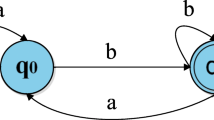Abstract
Motivated by Ying' work on automata theory based on quantum logic (Ying, M. S. (2000). International Journal of Therotical Physics, 39(4): 985–996; 39(11): 2545–2557) and inspired by the close relationship between the automata theory and the theory of formal grammars, we have established a basic framework of grammar theory on quantum logic and shown that the set of l-valued quantum regular languages generated by l-valued quantum regular grammars coincides with the set of l-valued quantum languages recognized by l-valued quantum automata.
Similar content being viewed by others
REFERENCES
Birkhoff, G. and von Neumann, J. (1936). The logic of quantum mechanics. Annals of Mathematics 37, 823-843.
Gudder, S. (1999). Quantum automata: An overview. International Journal of Theoretical Physics 38(9), 2261-2282.
Gudder, S. (2000a). Quantum languages. In Current Research in Operational Quantum Logic: Algebras, Categories, Languages, B. Coecke, D. Moore, and A. Wilce, eds., Kluwer Academic, The Netherlands, pp. 289-310.
Gudder, S. (2000b). Basic properties of quantum automata. Foundations of Physics 30(2), 301-319.
Gudder, S. (2000c). Quantum computer. International Journal of Theoretical Physics 39(9), 2151-2177.
Gudder, S. (2002). Properties of quantum languages. International Journal of Theoretical Physics 41(4), 569-591.
Howie, J. M. (1991). Automata and Languages. Oxford University Press, Oxford, 1991.
Kondacs, A. and Watrous, J. (1997). On the power of quantum finite state automata. In 38th Annual Symposium on Foundations of Computer Science.
Lu, R. Q. and Zheng, H. (2002). Lattices of Quantum Automata. Submitted to International Journal of Theoretical Physics. Personal communication.
Moore, C. and Crutchfield, J. P. (2000). Quantum automata and quantum grammars. Theoretical Computer Science 237, 275-306.
Qiu, D. W. (2002a). Characterization of sequential quantum machines. International Journal of Theoretical Physics 41(5), 811-822.
Qiu, D. W. (2002b). Quantum pushdown automata. International Journal of Theoretical Physics 41(9), 1627-1639.
Qiu, D. W. (2002c). Automata and Grammars Theory Based on Quantum Logic (in Chinese), Accepted by Journal of software (in China). Personal communication.
Ying, M. S. (2000a). Automata theory based on quantum logic (I). International Journal of Theoretical Physics 39(4), 985-996.
Ying, M. S. (2000b). Automata theory based on quantum logic (II). International Journal of Theoretical Physics 39(11), 2545-2557.
Author information
Authors and Affiliations
Rights and permissions
About this article
Cite this article
Cheng, W., Wang, J. Grammar Theory Based on Quantum Logic. International Journal of Theoretical Physics 42, 1677–1691 (2003). https://doi.org/10.1023/A:1026135502749
Issue Date:
DOI: https://doi.org/10.1023/A:1026135502749




